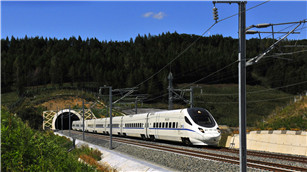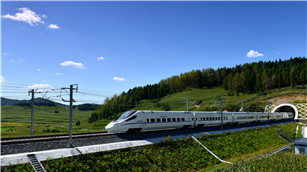Jilin builds modern sightseeing agricultural demonstration zone
2014-10-22
A cultural tourism festival was held in Leshan, a town in Changchun city in Northeast China's Jilin province in October, attracting very many visitors.
Li Min, one of the visitors from Changchun, bought two and a half kilograms of rice and one kilogram of crabs after she tasted pollution-free vegetables at a vegetable plantation facility in Leshan.
"Leshan is close to the downtown area and it's a good place to explore folk culture and taste green and healthy food," she said.
There are many similar places in Jilin that are developing distinctive farm products to upgrade the traditional agriculture industry and carve out a path for ecological tourism.
Liu Futang, a 65-year-old farmer in Leshan town, has been planting paddies for decades, and he has benefited from changes in planting methods this year. "When a paddy goes green, I will put crabs in the paddy field. The crabs will eat weeds, and we can use less pesticide, which ensures green and healthy rice and a higher price," said Liu.
Liu said that costs of crab and land are roughly 1,300 yuan per mu (667 square meters), and rice output in autumn is approximately 650 kilograms per mu. The crab-method rice can be sold at 3.4 yuan per kilogram, so he can bring in nearly 160,000 yuan ($26,000) in income every year.
At the moment, Liu has signed a deal with a local supermarket and he supplies all of its rice. He doesn't have to worry about the sales of his products anymore. "A total of 60 hectares of paddy rice has been planted in Leshan this year, with 300,000 kilograms in output. The rice output might dip a little but quality has been significantly improved, thanks to the reduced pesticide use," said Zhou Guohong, Party secretary of the town.
The local government uses its tourism festival to promote paddy rice, which not only helps increase residents’ income but also boosts Leshan's transformation, according to Zhou.
At the moment, it's hard to find traditional agriculture production in Leshan. Instead, ecological agriculture, green vegetable plantation and flowers and plants cultivation facilities have sprung up, turning Leshan into a sightseeing agricultural demonstration zone.
There is a fishpond in the middle of a greenhouse where grows all kinds of vegetables. The fish excrement can be used as organic fertilizer for vegetables, which, in turn, will help clean water for the fish, according to Meng Fanchen, a manager from a local agriculture tech company.
"Vegetables here are not only pesticide-free but also carry a more savory taste and last longer in preservation," said Meng. They have been sent to schools, company canteens and supermarkets, according to Meng.
The town also supplies many flowers and plants to Heilongjiang and Liaoning, and the ecological agricultural development helps triple or even quintuple the value of Leshan's flowers and plants. As a result, farmers’ incomes increase, and the local living environment has improved.
"Leshan witnessed nearly 10,000 visitors this September, and the green plantation facility has hooked up with more than ten enterprises," said Zhou Guohong. "We'll use the existing plantation facility and countryside to speed up the construction of a modern sightseeing agriculture demonstration zone and help farmers increa




